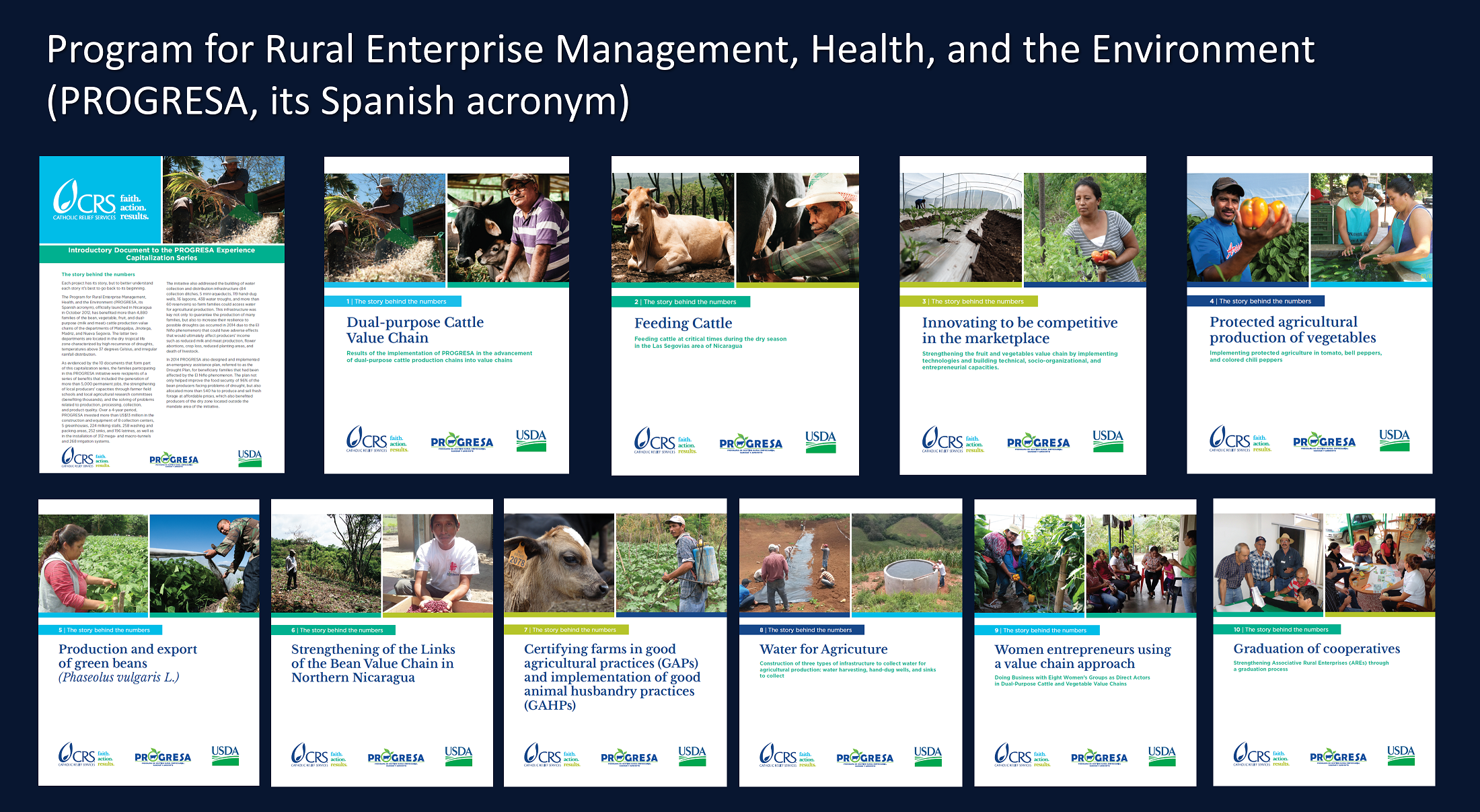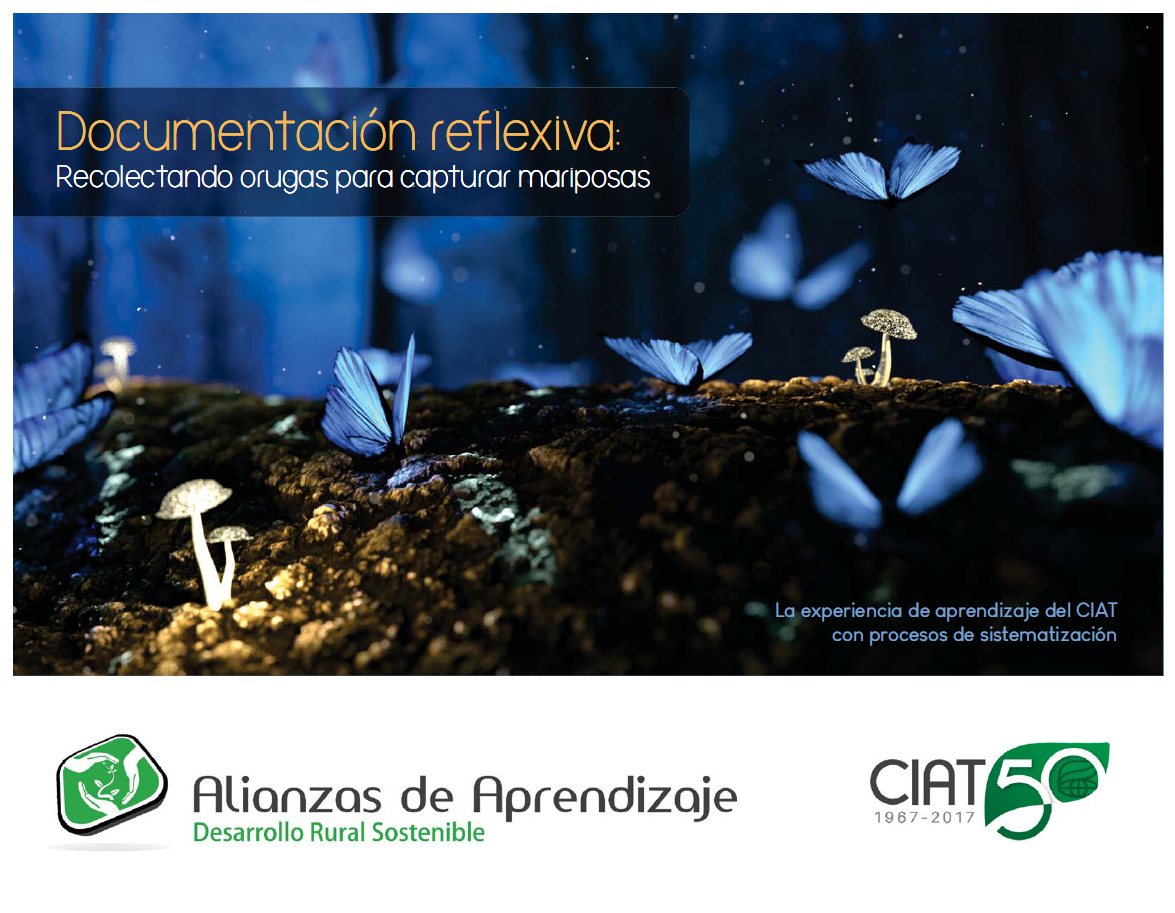Blog We publish the memoirs of a secret laboratory in Central America

In our past experiments perhaps there are answers to questions that we have today and to the problems of the future... But how can we know?
Photo credit: © Stergo / Pixabay
A secret laboratory in Central America is how I sometimes see Learning Alliance ... It reminds me of Dexter's Laboratory, a cartoon series that started in 1995, and in which a boy genius had the most incredible laboratory hidden under his room... And I wonder if in our experiments from the past there are answers to questions we have today and to the problems of the future... But how can we know?
Since 2003, when the first Learning Alliance was formed under the IDRC-funded project, (The Alliance of Bioversity International and the International Center for Tropical Agriculture (CIAT), the parent of this initiative, and the partners at the time, including Catholic Relief Services - CRS) we had the opportunity to experiment with different tools that sought to promote rural development in the most systematic and comprehensive way possible. In each Cycle (see image below), we chose a methodology that responded to the most common and sensitive questions for the participating organizations. Each organization applied the methodology in their own context, within their own ongoing projects. In doing so, bonds were woven that became very valuable in terms of learning. We saw how we were advancing together as well as each organization on its own.
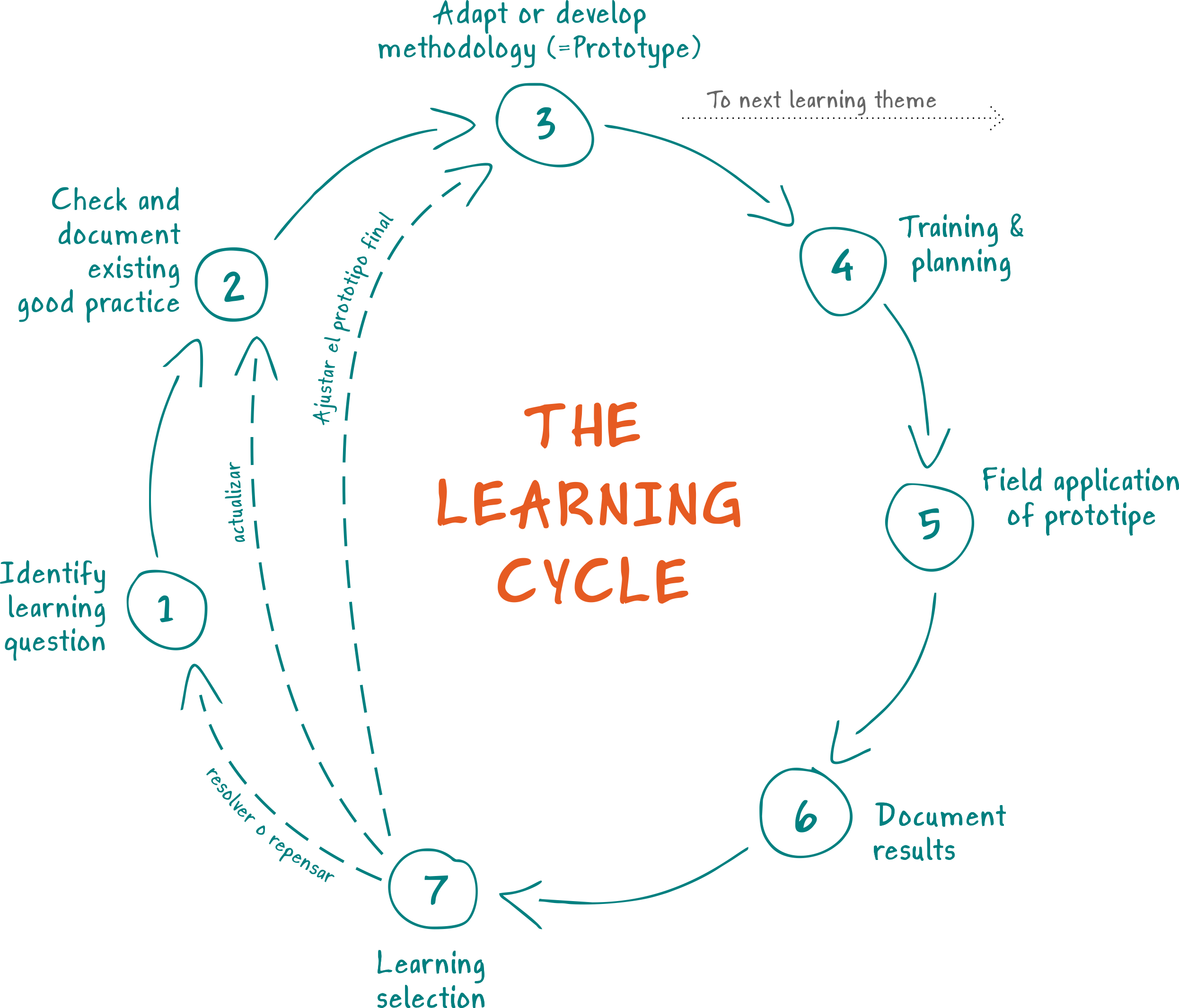
Many of these cycles revolved around The International Centre for Tropical Agriculture’s (CIAT) methodological proposals ─ at that time represented by a unit called the Rural Business Development Project, better known internally as Agroempresas (Agrobusinesses). Our methodologies turned out to be novel and very attractive to our Alliance partners, because they appeared to respond to the major problems identified in the region. Agroempresas had a participatory and area based approach to rural agro-enterpirse development, colloquially known in Spanish as the OT-DER (Territorial Approach on Rural Enterprise Development), from which market problems were viewed within the framework of the entire territorial system, made up of different stakeholders, types of resources and livelihoods, with joint planning needs based on real and beneficial market opportunities for the different actors in the prioritized productive chains.
The work scheme proposed by the OT-DER was more or less as follows:
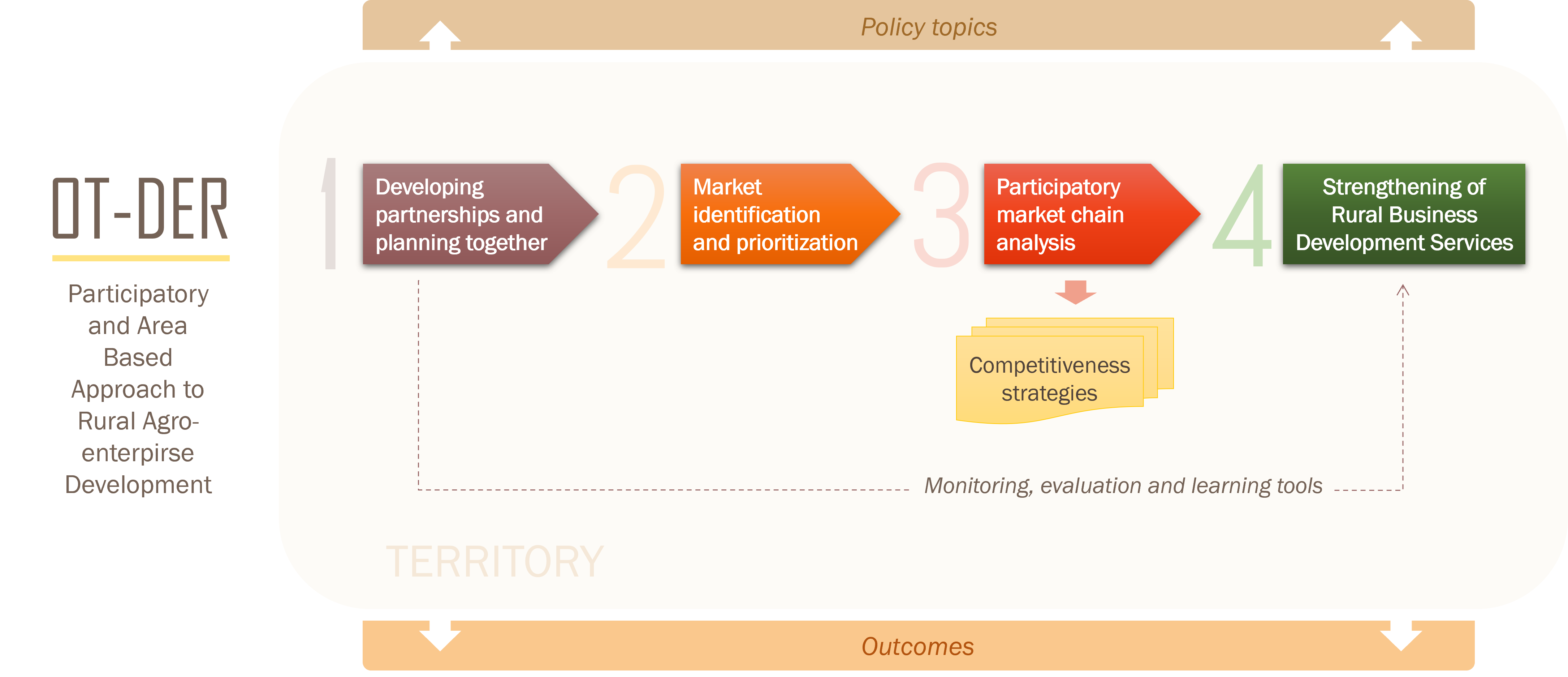
For each of these stages we had a methodological proposal, and these proposals became the prototypes which were applied, tested, adjusted, and adapted in several learning cycles, in which CARE Guatemala, CARE Nicaragua, Cáritas San Marcos, CIAT, CRS El Salvador, CRS Nicaragua, Empresa de Servicios Agropecuarios de Nicaragua (Agricultural Services Company of Nicaragua), Escuela Nacional de Agricultura de El Salvador (National Agricultural School of El Salvador), FUNICA (Foundation for the Development of Agricultural, Livestock and Forestry Technology of Nicaragua), Mercy Corps, Oxfam GB, Save the Children and SNV Honduras participated, among many other organizations.
Over the years, these learning relationships bore much fruit, and many of them were consolidated into tangible products, thanks in part to a fundamental principle of the Learning Alliance: the documentation of its learning processes. For example, CRS produced improved versions of the guides initially published by CIAT; CATIE (Tropical Agricultural Research and Higher Education Center) led several learning cycles on Rural Associative Enterprises (from which five methodological guides were generated, some of which were also based on our methodologies); funding was obtained for a regional project on knowledge management for the development of sustainable value chains (2.0) (which resulted in a guide); and Peru formed its own alliance, with its own operating dynamics.
How many people have been benefited in all these years by the Learning Alliance? Frankly, we do not know, and it is difficult to get an exact figure now. One of our strategies was to work with international organizations that had an impact in each country and on other local organizations, which in turn had an impact on multiple actors (thus achieving greater reach). However, we were not very good at measuring and documenting the impact. However, just to get an idea, in a single learning cycle (in 2012), a single organization (CRS) benefited more than 7,000 poor families in rural Nicaragua through the "Alliance for the Creation of Rural Development Opportunities through Agribusiness Relationships" (ACORDAR) project. And while ACORDAR was not the common denominator among the projects participating in the Learning Alliance, I mention it, to illustrate the point I am making.
A well-kept secret
The relationship we have had with CRS since 2003 is one of the most fruitful. Perhaps because of the like-mindedness between the visions of its leaders, perhaps because of the empathy that existed between members of both organizations, perhaps because their interests coincided at the right time and in the right place... perhaps for all these reasons together... but since the beginning of the Learning Alliance, CRS was one of the organizations most interested in the methodologies we had developed and they began to resolutely train, use, implement and adapt them.
As a result, in 2007, when the ACORDAR project was launched, involving one third of Nicaragua's municipalities, and in which CRS was the leader of the executing consortium , CIAT provided conceptual and methodological advice to the project partners on the design and implementation of strategies to advance the competitiveness of the selected production chains (coffee, beans, and roots and tubers), which, incidentally, were intended to lead to value chains .
The design of competitiveness strategies was participatory and involved actors from the functional part of each chain (production, post-harvest, and marketing), such as business organizations, support services, and spaces for negotiation, consensus-building and collective action, as well as the technical and governance commissions. The former were management teams (one for each chain) made up of technicians from the executing consortium's partner organizations, who were responsible for promoting actions and coordinating the efforts of the different actors involved in the process. The second commissions were groups representing the chains, responsible for promoting and managing the most strategic demands of each of them with public and private bodies, both nationally and internationally.
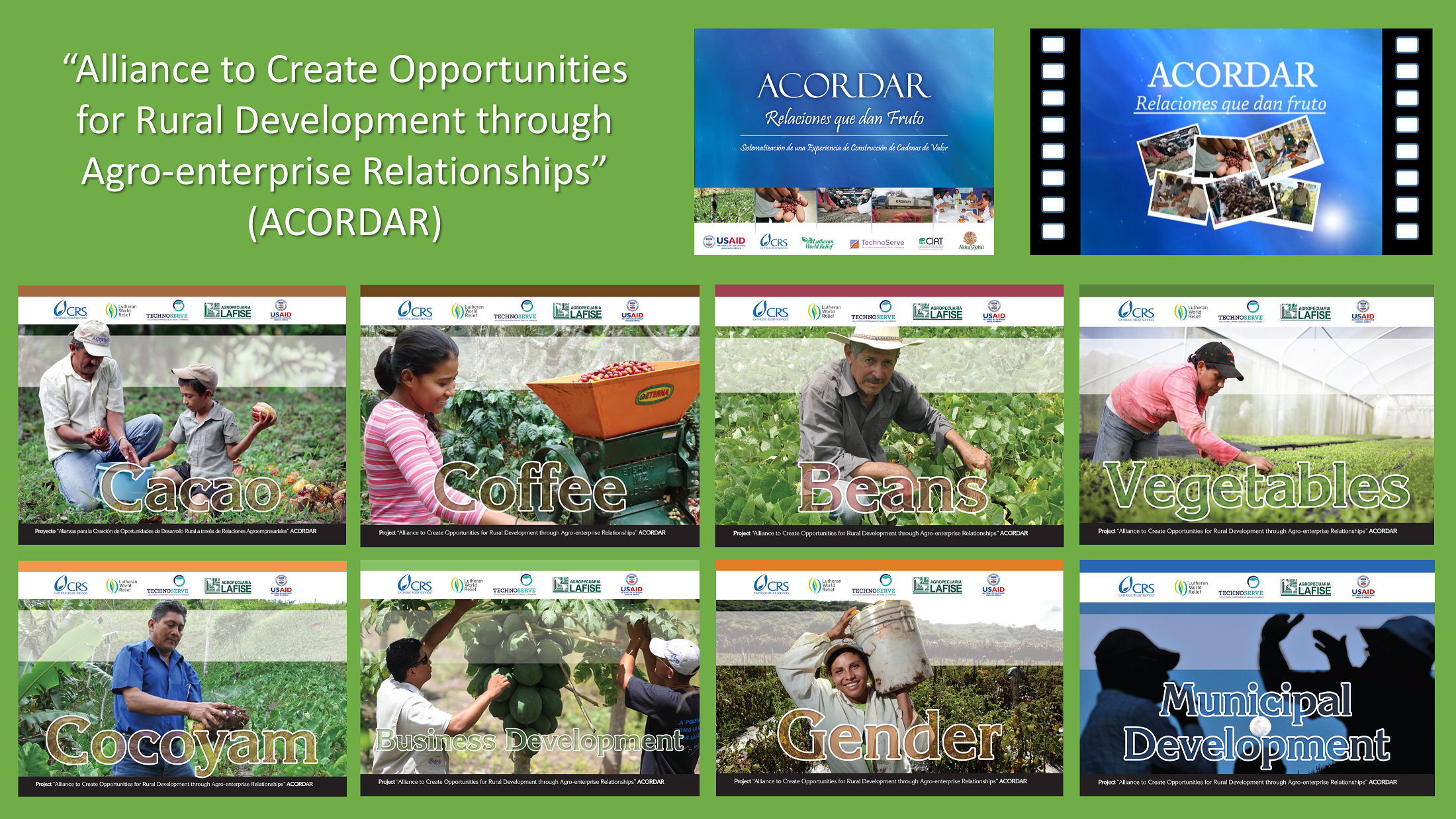
But there was another contribution that CIAT was expected to make, which, although it was intended as part of the value chain advisory services, ended up acquiring a dimension that at least I did not expect. That contribution was to develop processes of reflection and systematization aimed at organizing the enormous amount of information that was being generated (not only from monitoring and evaluation, but also from the application and use of methodologies and strategies) to recover lessons learned, so that both the technical teams and the methods used could continue to grow in the future.
In the case of ACORDAR, this systematization support, or reflective documentation (as I prefer to call it), resulted in the first phase of the project in a compendium which included 3 accounts of the strategies implemented in each chain to advance competitiveness, 5 stories of change that show evidence of the impacts achieved, a video that includes the main results of these 8 products, and 10 cases of innovation. The final phase of ACORDAR produced 13 stories (5 about value chains: Cacao, Coffee, Beans, Vegetables and Cocoyam; 1 about the Business Development component, 2 on Municipal Development, 4 on Gender and 1 introductory document to the series).
These results opened the door for new systematization support within the next project led by CRS in Nicaragua, called Progresa, in which case 10 accounts were produced on the main thematic proposals (Dual-purpose Cattle Value Chain, Feeding Cattle, Vegetable and Fruit Chain, Protected Vegetable Production, Green Beans Production and Export, Bean Chain, Certifying Farms in Good Agricultural Practices and Implementing Good Animal Husbandry Practices, Water for Agriculture, Women Entrepreneurs Using a Value Chain Approach, and Graduation of Cooperatives) and 1 introductory document to the series.
However, all these products have remained stored in Dexter's laboratory until today. For the first time we are publishing them, together with our learning experience with these systematization processes our learning experience with these systematization processes. Perhaps in our experiments in the past there are answers to the questions we have today and to the problems of the future... But how can we know...?
The CIAT team behind this story:
Rupert Best
Manager of the Rural Enterprise Development Project at CIAT from 1996 to 2004. Team Leader of the Initiative to Develop Evidence and Advocate Solutions at CRS from 2013 to 2015.
Currently working as a consultant
[email protected]
Shaun Ferris
Manager of the Rural Enterprise Development Project at CIAT from 2004 to 2008. Senior Technical Advisor on Agriculture and Environment from 2007 to 2013.
Director of Agriculture and Livelihoods at CRS since 2013
[email protected]
Mark Lundy
Researcher for the Rural Enterprise Development Project until 2008 and leader of the Learning Alliances project funded by IDRC.
Leader of the Linking Producers with Markets team until 2018.
Leader of the Sustainable Food Systems Program until 2020.
Director of the Food Environment and Consumer Behavior Research Area of the Alliance of Bioversity International and the International Centre for Tropical Agriculture (CIAT) until 2020
[email protected]
María Verónica Gottret
Economist at CIAT from 1991 to 2006.
Value Chain Specialist at CATIE from 2006 to 2012, when she also served as coordinator of Learning Alliances in Central America and was leader of the regional Value Chain Alliances 2.0 project.
Senior Technical Advisor for Agricultural Livelihoods Research and Regional Technical Advisor for Knowledge Management and Learning at CRS since 2012.
[email protected]
Carlos Felipe Ostertag
Co-founder of the Rural Enterprise Development Project at CIAT and director of the Andean Region until 2008.
Jhon Jairo Hurtado
Researcher for the Rural Enterprise Development Project until 2008.
Associate Researcher with the Linking Producers with Markets team until 2018 and facilitator of several learning cycles of alliances around value chains and inclusive business.
Associate Researcher with the Sustainable Food Systems Program until 2020.
Senior Research Associate of the Food Environment and Consumer Behavior Research Area of the Alliance of Bioversity International and the International Centre for Tropical Agriculture (CIAT) until 2020
[email protected]
Erika Eliana Mosquera
Visiting researcher in 2003
Communications assistant for the Rural Enterprise Development Project from 2004 to 2008 and facilitator of various reflective documentation processes for Learning Alliances.
Communications analyst for the Linking Producers with Markets team from 2012 to 2018.
Communications analyst for the Sustainable Food Systems Program until 2020.
Analyst of the Food Environment and Consumer Behavior Research Area of the Alliance of Bioversity International and International Centre for Tropical Agriculture (CIAT) since 2020.
[email protected]
Paola Andrea Victoria
Visiting Researcher at CIAT from 2004 to 2005, Learning Alliance Communication and Knowledge Facilitator from 2006 to 2008, and Knowledge Manager from 2010 to 2011.
International consultant who has worked with the International Labor Organization, the Office of the United Nations Special Representative for Food Security and Nutrition and the Scaling Up Nutrition (SUN) Movement.
Currently responsible for country participation in the Sustainable Food Systems Summit dialogues in 4SD - Skills, Systems and Synergies for Sustainable Development.
[email protected]

